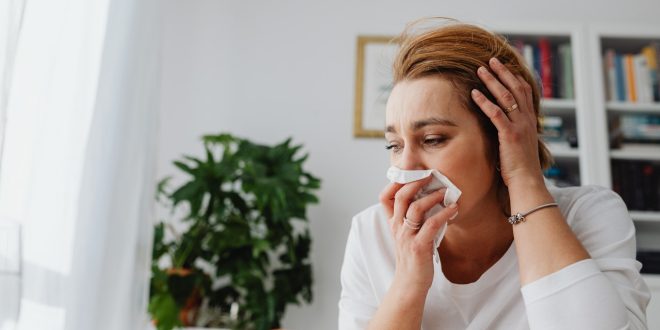For some people, allergy season is only in the summer, but for others, it’s a persistent problem all year round. Allergies don’t just stem from tree or flower pollen but can come from food, dust, pets, mold, and other external triggers that are in our everyday environment. Here are some steps to reduce allergens inside your home/office and outdoor environment, as well as a few remedies for symptoms.
Keep Your Home As Clean As Possible
One of the best ways to reduce allergic reactions to things in your home is to clean your space frequently. Actions like dusting, vacuuming, and mopping floors can help limit your exposure to the substances that could be triggering an allergic reaction. Also, pay particular attention to the products you use in your home. Cleaners, personal care items, and air fresheners can be among the worst culprits for triggering allergic reactions in sensitive people. I recommend going as natural as you can to minimize exposure to toxic chemicals.
Consider What Surrounds You In Your Home
 You may love the look and smell of fresh flowers and plants, but they could be a source of irritation to you. Experiment to see if they bother you when you are near them. If so, consider using fake flowers or artificial plants to bring color and texture to your space. Take a good look around to see what could be problematic for you. Check cabinets, under the sinks, and in any areas that don’t get cleaned frequently.
You may love the look and smell of fresh flowers and plants, but they could be a source of irritation to you. Experiment to see if they bother you when you are near them. If so, consider using fake flowers or artificial plants to bring color and texture to your space. Take a good look around to see what could be problematic for you. Check cabinets, under the sinks, and in any areas that don’t get cleaned frequently.
Do also consider how your home is insulated, including the windows. If you have single glazed windows and lots of gaps in the walls that potentially allow irritants and allergens into the property, consider some upgrades. There are many companies out there that can upgrade wall insulation, as well as windows. A Renewal by Andersen window replacement can give you a variety of options for comfort, energy efficiency, and ambiance.
Know Your Triggers
Sometimes, it’s fairly simple to discover the sources of allergens. That said, some more challenging cases might require assistance from an allergy specialist. An allergist can run blood tests, as well as skin testing to identify the culprits whether they are food or environment-related.
Be aware that it can be distressing if you get the results and there are many allergens on this list. Know that it is common for sensitive people to have a variety of allergens, such as specific fruits, wheat, dairy, or peanuts. Work with your allergist to create a plan to reduce your exposure to these allergens. In some cases, patients can be desensitized to the triggering allergens over time.
Washing and Rinsing
 After returning home from outside exposure, the best thing you can do is to put your clothes in the laundry straight away, shower, or, at least, wash your face. Tiny particles can stick to your hair, clothes, and inside your nasal cavity. Consider rinsing out your nose with a Netti pot or other type of sinus rinsing system. A nasal rinse can help remove anything that doesn’t belong, as well as alleviate sinus symptoms associated with allergies.
After returning home from outside exposure, the best thing you can do is to put your clothes in the laundry straight away, shower, or, at least, wash your face. Tiny particles can stick to your hair, clothes, and inside your nasal cavity. Consider rinsing out your nose with a Netti pot or other type of sinus rinsing system. A nasal rinse can help remove anything that doesn’t belong, as well as alleviate sinus symptoms associated with allergies.
You can also press the acupuncture point in between your eyes to drain your nose or practice breathing exercises that include holding your breath and plugging your nose for a certain amount of time between breaths.
Avoid Smoke, Aerosol Sprays, and Extreme Scents
Avoid the things that can make your symptoms worse, such as cigarette smoke, aerosol sprays, wood burning in the fireplace, perfume, some candles, and heavily scented products. Unfortunately, you might not know what triggers you until you come in contact with it, but you can be proactive by avoiding potential threats.
Try Acupuncture
Acupuncture can be effective in reducing allergy symptoms. Of course, everyone is different, so it is something you will just have to try for yourself. If you are looking for a more cost-friendly way of performing acupuncture, acupressure can be done on yourself, and some people even use acupuncture kits. However, it is best to go with a trained acupuncturist for safety and understanding of what your specific needs are.
Use an Air Filtration System
Consider installing a HEPA filter on your air conditioning system or add a stand-alone air filter to your most frequently used rooms. Do either of these will help you cut down on dust and other particles that could be disrupting your respiratory system.
**** This post is strictly informational and is not meant to replace the advice of your healthcare provider. Women’s lifelink, its owners, administrators, contributors, affiliates, vendors, authors, and editors do not claim that this information will diagnose, treat, or improve any condition or disease.
 Women's Life Link Be Well, Be Happy, Be YOU!
Women's Life Link Be Well, Be Happy, Be YOU!





